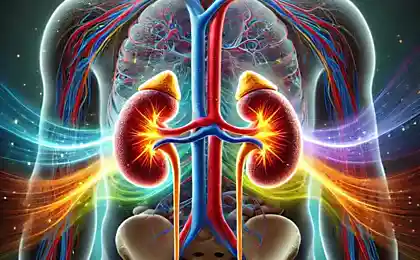647
Low Cortisol when no stress, there is no ....

One of the stress hormone is cortisol. The greater the stress, the higher the level of cortisol in our blood, and the more suffering brain, immune system, bones, skin, hair ...
With him calling to fight many writers. However, as is well known, "what zaduzha then not HEALTHCENTER". Reduced levels of cortisol is also a cause of a number of pathological conditions and cause an inadequate response to stress.

Consider two options, which are similar manifestations:
1. Stress the child during the first year of life, especially in the first four months. Excess cortisol leads to the closure of cortisol receptors (self-defense of the organism). The age at which the child receives such an experience can be decisive in the formation of the phenomenon of low cortisol.
2. Chronic stress in adults, for more than ten years. This leads to depletion of glands producing the formation of cortisol and chronic fatigue syndrome. The mechanism of development of this style of regulation is not fully understood. One of the versions put forward suggests that in the body for a long time exposed to large doses of cortisol, gradually cease to function sensitive to it receptors.
This can be viewed as a psychophysiological mechanism of protection, as the body's attempt to dissociate itself from the unbearable, uncontrolled feelings. This type of reaction as it mutes all the feelings and reactions of the individual, which helps to cope with the pain, but prevents normal reactions unfold. In adults, chronic stress can lead to adrenal exhaustion (adrenal resistance), which reduces the stress release of cortisol and its baseline.
Both of these states have some common features of manifestation:
Emotional blunting, aggression, impaired reaction to stress (including a tendency to depression), autoimmune diseases, and chronic fatigue syndrome.
1. Yes, a high cortisol is a strong reaction to stress, but normal cortisol is important in order to adequately perceive the environment. Low baseline cortisol levels and low release of cortisol in response to stress. It sounds good? Alas. Switching to low cortisol mode seems to be one of the mechanisms of protection.
This is an attempt to disconnect from the painful feelings by ignoring them, turning inward and denial of the painful experience; it is better to feel nothing, than to deal with the painful experience quite a long period of time. But this (unconscious) strategy can lead to a state of emotional numbness, and possibly temporary loss of mind control, which may cause a person to feel the desolation, alienation towards other people.
Children are in such a state on the way of passive copying, which makes it less able to respond when required. For example, in one study in kindergarten children with low baseline cortisol level did not respond to an extremely tense and stressful day, an increase in cortisol (Dettling et al., 1999).
Somehow the way these children learn to ignore the impact of painful or stressful incidents, reaching even to completely turn off their stress response mechanism. Unfortunately, this can lead to a complete shutdown of feelings at all. These children also react little and happy events, but they learn to fasten on a mask of feigned happiness. Thus, low cortisol can lead to stress that the positive (joy, euphoria, passion) can not be felt.
2. Yes, the increased cortisol leads to excessive nervous excitement, but normal cortisol is important for an adequate perception of the world. Low cortisol is often associated with poor quality of life, frequent emotional (and physical) abuse and neglect.
Recent experiments with monkeys Andrea Dettling (which, as we are primates) have shown that only those individuals that are in the early separated from their mothers (for up to two hours per day), has formed a low baseline cortisol. And their brothers and sisters from the same litter, as well as those individuals who are weaned from the mother at an age when they have already been partially independent, such a low base is not formed (Dettling et al., 2002).
Researchers continue to clarify the circumstances and age, which dates back to the phenomenon of low cortisol, but it seems that the child neglect and deprivation of all sorts in a very early age play a key role.
It may seem paradoxical that it is the children who exhibit the most destructive behavior, most try to suppress their own feelings. Thus, the most aggressive boys at school - it is not those who go beyond the limit of stress hormones, and those who have seen their low baseline
. Their anger is boiling in them over low heat just below the surface, perhaps they are not even aware of this report. Perhaps its roots in very early childhood, when a child neglected, when he constantly felt the hostility that influenced the formation of his system response to stress.
One important study (maxi- Burnett et al., 2000), it was found that the earlier antisocial behavior manifested in boys, the more likely find their cortisol level is very low, it was shown that students with abnormally low baseline cortisol We were unable to respond to a stressful situation normal doses of hormone release.
Changing their ways to respond, the child protects himself from intolerable negative emotions. Unfortunately, so it becomes less sensitive to positive stimuli (meaning it is a hormonal reaction, because such children may well represent a positive reaction mime).
Unfortunately, the suppression of feelings can not make them disappear. On the contrary, it may even improve mental stress. That's why these feelings eventually spills out in a form not amenable to control and forecast. Suppressed aggression can not show up until you see a relatively safe situation, which for a long time to squeeze and release the spring. In this case, the child's behavior is inadequate situation. "Where is it?", "What had come over him?" - It's all about such cases.
Children who are beginning to show the first signs of aggression at an early age, physiologically different from those of boys who become aggressive adolescents. These more mature rebels that antisocial behavior in adolescence, but did not behave so at a younger age, better understand their subtle feelings and are able to express their concern and anxiety. Their high cortisol suggests that these young people behave poorly in response to (perhaps temporarily) rather on the growing stress than earlier dysfunctional experience.
3. Yes, excess cortisol impairs cognitive function and memory, but normal levels of cortisol is important to forget the stress and find the strength to continue on. Users whose system response to stress have adapted to it at an early age a protective low cortisol levels are subject to a variety of diseases. In particular, there is a strong link between low cortisol and post-traumatic stress disorder and depression.
4. Yes, the high cortisol suppresses the immune system. But normal levels of cortisol is important for the control of the immune system without your immune system starts to attack the own body. People with low cortisol prone to chronic fatigue syndrome, asthma, allergies, arthritis, depression and seasonal (Heim et al., 2000).
5. Yes, cortisol is a stress hormone. But not only poor, but also a good stress. Low cortisol is also associated with a general lack of positive feelings and emotions in life. Despite the fact that this disorder does not lead to permanent ill health, as is the case with depression, it can lead to a general feeling emotionally bleak life. Ego suggests a special type of emotional life, which was named "alexithymia" - difficulty in expressing the words of emotion. Indeed, one of the scientists found decreased levels of cortisol in patients with alexithymia (Henry et al., 1992; Henry, 1993).
This psychological type was identified when working with patients suffering from a classic psychosomatic disorders such as asthma, arthritis, ulcerative colitis (Nemaya and Sifneos, 1970), but later on he found confirmation for a much wider range of diseases.
Difficulties in naming feelings and recite back, perhaps to an early communication between parent and child. If the mother does not teach a child to clothe in words bodily sensations, it probably does not acquire the skill to organize their feelings and sensations, and manage different kinds of mental stress without resorting to the help of others.

Indeed, professionals working with patients suffering from psychosomatic diseases, found that they tend to be heavily dependent on one or a few people (but a small number), and when the key relationships that help them in the regulation, to an end or become less tight they get sick (Taylor et al., 1997).
Author: Andrew Beloveshkin























